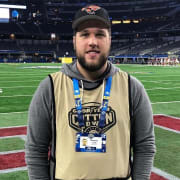Ohio State Fencing, Women’s Golf And Women's Basketball Programs Placed On Probation For NCAA Violations
The Division I Committee on Infractions revealed on Tuesday afternoon the Ohio State fencing, women’s golf and women’s basketball programs committed multiple NCAA violations “over the course of several years.”
Violations occurred in Ohio State fencing, women’s golf and women’s basketball programs: https://t.co/Xzi3vkxuHq pic.twitter.com/MEYo6zhVAL
— NCAA News (@NCAA_PR) April 19, 2022
As punishment, all three programs have been placed on four years probation and the university has been fined $5,000, plus 3 percent of the fencing program budget and 1 percent of the women’s golf and women’s basketball budgets.
The athletic department also self-imposed several penalties, which included postseason bans for all three programs and reduction of scholarships for the 2020-21 season, as well as vacating wins in which ineligible athletes participated.
The report – which involves former fencing head coach Vladimir Nazlymov, former women’s golf coach Therese Hession and former women’s basketball associate head coach Patrick Klein – noted they violated head coach responsibility rules and/or ethical conduct rules by not fully cooperating with the investigation.
The panel held a hearing to exempt the school’s compliance monitoring program, but ultimately determined that a failure-to-monitor violation did not occur.
“The panel recognizes that the institution dedicates significant resources to its compliance program that, in many ways, exceed those of other Division I institutions,” the panel said in a statement. “To be clear, resource dedication alone does not fulfill the minimum compliance requirements … but here, the resources combined with the compliance program that Ohio State had in place outweighs the deficiencies identified by the panel.”
A brief synopsis of the violations can be found below, while the full report can be found here.
Fencing
- Nazlymov arranged, provided or directed other coaches to pay more than $6,000 in recruiting benefits to three prospects, primarily in the form of free access to the practice facility.
- Two of those prospect received free meals and private lessons from Nazlymov. This allowed the coaching staff to observe the prospects, which is considered an impermissible tryout.
- Nazlymov provided or directed coaches to provide 18 student-athletes with more than $8,000 in impermissible benefits in the form of free access to his local sports club. Those 18 student-athletes then competed while ineligible.
- An assistant coach arranged flights to the United States, transportation and lodging for two prospects to attend a camp and compete in the USA Fencing Nationals. He also impermissibly owned and operated a fencing sports club in Italy while employed by Ohio State.
- The program violated countable coaches rules when Nazlymov invited an international coach to consult with the program. The consultant led drills, gave individual lessons and provided verbal instruction during practices and workouts.
Women’s Golf
- Hession frequently ended practices 15-30 minutes beyond the four-hour daily limit on weeks without qualifying rounds and exceeded the 20-hour weekly limits during weeks with qualifying rounds. This
- She failed to ensure the accuracy of individual student-athletes’ activity logs and did not log actual practice times, instead estimating practice hours for the entire team.
- Student-athletes express concern about how practices ran late, making them late to class, tutoring sessions or other obligations.
Women’s Basketball
- Klein initiated contact with student-athletes with the goal of forming personal relationships that exceeded a coaching relationship.
- He provided them with impermissible benefits, including paying for manicures, loans for rental cars and purchasing textbooks for a student-athlete who was not on scholarship.
- Klein asked six current or former student-athletes to assist in the recruitment of six prospects. Because they didn’t have preexisting relationships and the communication did not occur during an official visit, this was an NCAA violation.
- He paid $100 for bottle service for two prospects at a club and contacted three prospects before Sept. 1 of their junior years of high school, both of which are NCAA violations.
- Additionally, the investigation determined the program violated countable activity rules because coaches were present for pre-practice shootarounds but did not record those hours.
Among the wins and championships that will be vacated include the women’s basketball team’s 2017 and 2018 Big Ten regular season championships, 2018 Big Ten Tournament championship, 2017 and 2018 NCAA Tournament appearances, 2019 NIT appearance and 52 victories.
The fencing program, meanwhile, has vacated its 2016, 2017 and 2018 Midwest Fencing Conference titles, 2016 and 2017 NCAA runner-up finishes and 2018 NCAA third-place finish.
“I’m proud of our university, athletics department and the involved sport programs for our management of this matter,” athletic director Gene Smith said in a statement. “We are committed to our proactive and pre-existing system of compliance methods and rules education.
“A comprehensive compliance program ensures adherence and institutional control over the athletics department and furthers the mission of the university. We are pleased that this matter is now behind us, and our focus remains on our student-athletes.”
Ohio State’s four years of probation will end on April 18, 2026.
-----
Be sure to check out our new message boards, Buckeye Forums. We'd love to have you part of the conversation during the season.
-----
You may also like:
Former Ohio State CB Sevyn Banks Transferring To LSU
Denzel Ward Signs Five-Year, $100.5 Million Extension With Browns
2023 Florida CB Dijon Johnson Commits To Ohio State
How Johnson's Commitment Impacts Ohio State’s 2023 Recruiting Class
2023 Florida WR Bryson Rodgers Commits To Ohio State
How Rodgers' Commitment Impacts Ohio State’s 2023 Recruiting Class
-----
Be sure to stay locked into BuckeyesNow all the time!
Join the BuckeyesNow community!
Subscribe to the BuckeyesNow YouTube channel
Follow Andrew on Twitter: @AndrewMLind
Follow BuckeyesNow on Twitter: @BuckeyesNowSI
